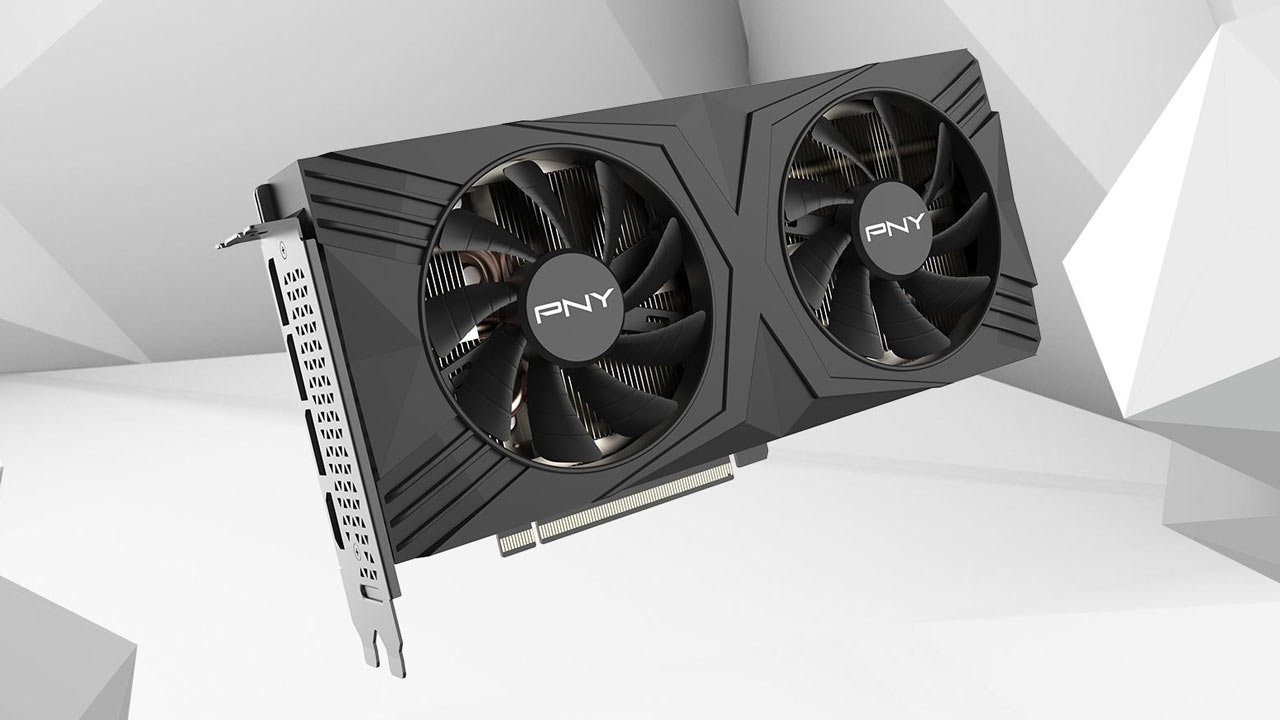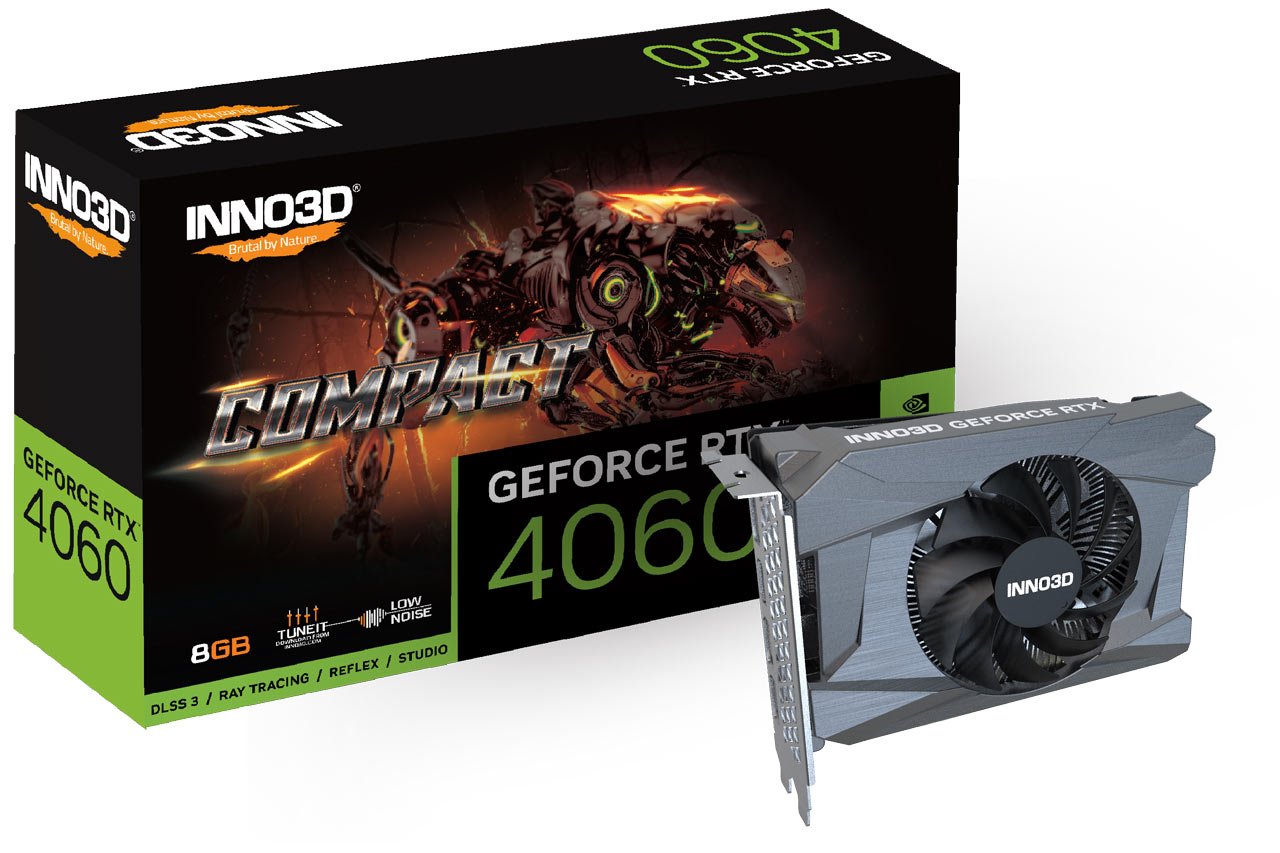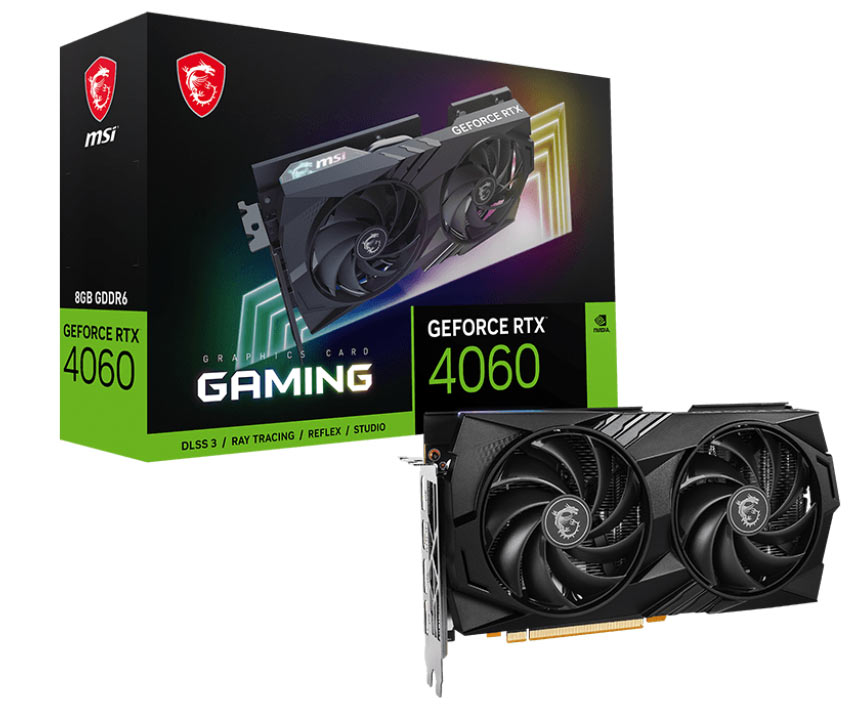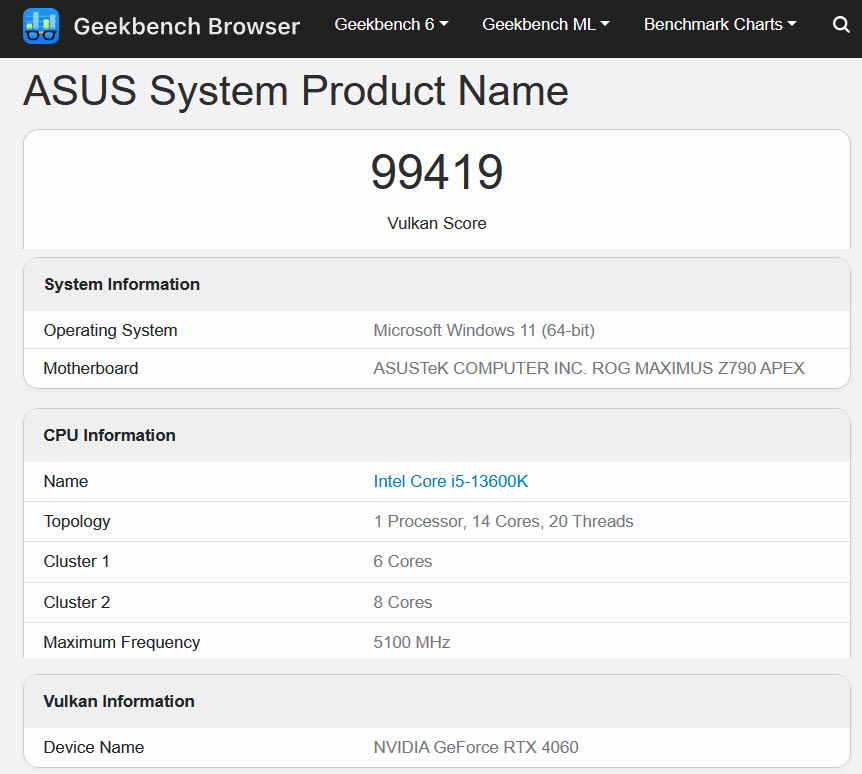Nvidia RTX 4060 Is Allegedly up to 20% Faster Than RTX 3060 in Geekbench
GPU compute tests are positive, but Geekbench scores vs gaming FPS correlate poorly.

Some of the first purported benchmarks for the upcoming Nvidia GeForce RTX 4060 have leaked out. Benchleaks has spotted two different Geekbench 6 runs, apparently using this graphics card: the first run was the GPU Compute test using the Vulkan API, and there was another one using OpenCL. According to the leaks, the shiny new RTX 4060 runs almost a fifth faster than the RTX 3060 if these tests are genuine and representative of the final product. Take the data with a pinch of salt for now.
Nvidia revealed its plans for RTX 4060-class graphics cards back in mid-May and we know that we should expect the RTX 4060 8GB model in July. This, the first AD107 GPU-based desktop graphics card to be launched, has since had its launch date officially pinpointed to June 29th at 6 AM Pacific time. With a little over a week to go until launch day it wouldn't be surprising if reviewers and similar early access testers have put this GPU through Geekbench, precipitating these leaks.
We mentioned that these early Geekbench 6 GPU compute benchmarks indicate that the upcoming RTX 4060 is about a fifth faster than its predecessor, the RTX 3060. Let us look closer at the numbers, and throw in a couple of other reference points for a wider picture.
|
GPU | Vulkan |
OpenCL |
|---|---|---|
|
RTX 3060 |
85,996 |
88,280 |
|
RX 7600 |
95,147 |
80,209 |
|
RTX 4060 |
99,419 |
105,630 |
|
Arc A770 |
100,449 |
107,168 |
|
RTX 3060 Ti |
104,776 |
112,159 |
|
RTX 4070 |
144,235 |
165,645 |
|
RTX 4080 |
201,752 |
246,060 |
|
RX 7900 XTX |
219,202 |
198,055 |
Please remember that the RTX 4060 result, if genuine, appears to be based upon a single sample so the Geekbench average could change quite a bit when more cards run these tests. We'll be covering the RTX 4060 in full detail when it launches. Keep the salt handy for now.
Pondering over the table's Vulkan API scores, it looks like the new RTX 4060 is about 12% faster than the RTX 3060. In Open CL tests the difference is better, with the new Ada Lovelace card being very nearly 20% faster. Geekbench scores have a reputation for not correlating very closely with gaming performance, so we will be looking out for further leaked third party benchmarks to get a clearer picture of the RTX 4060 between now and next Thursday.


The specs of the upcoming GeForce RTX 4060 are going to be a GPU with 24 SMs, 3072 CUDA cores, 24 MB of L2 cache. This will be paired with a memory subsystem featuring 8 GB of 17 Gbps GDDR6 memory, operating on a 128-bit wide bus for 272 (453 effective) GBps bandwidth. The reference card will run at approximately 115 W TGP. The launch price we have is $299, but with luck there will be some models released cheaper than this.
Nvidia's GeForce RTX 4060 might just do enough to earn a place on our list of the Best Graphics Cards for Gaming in 2023, we shall have to wait and see.
Get Tom's Hardware's best news and in-depth reviews, straight to your inbox.

Mark Tyson is a news editor at Tom's Hardware. He enjoys covering the full breadth of PC tech; from business and semiconductor design to products approaching the edge of reason.
-
FIRST !Reply
Btw, a 20% boost in performance at a lower price does sound good but that's only if the 3060 Ti doesn't end up being priced close to $300 USD. The 3060 Ti might eat up sales of the RTX 4060 since it offers a wider memory bus.
https://nl.hardware.info/nieuws/85507/gpu-prijzen-vorige-generatie-blijven-zakken-nieuwste-videokaarten-even-duur -
On some Off Topic note, regarding the Ti SKU variant.Reply
For GAME emulation, 128-bit mem bus width creates a huge bottleneck. YUZU developers found the GeForce RTX 4060 Ti to be a serious downgrade for emulation purposes compared to the older GeForce RTX 3060 Ti.
According to them. when using the NVIDIA GeForce RTX 4060 Ti for Switch emulation, you will get slower performance compared to the RTX 3060 Ti due to its narrower 128-bit bus. So this RTX 4060 non-Ti shouldn't be an exception.
Despite the higher L2 cache, using a 2x upscale easily eats up vast pools of cache and that leaves you with the 128-bit wide bus interface which is a downgrade versus the previous Ti offering.
https://yuzu-emu.org/entry/yuzu-progress-report-may-2023/
We don’t understand what kind of decisions NVIDIA took when deciding the Ada Lovelace GeForce product stack, but it has been nothing but mistakes.
The RTX 4060 Ti 8GB with only a 128-bit wide memory bus and GDDR6 VRAM is a serious downgrade for emulation when compared to its predecessor, the 256-bit wide equipped RTX 3060 Ti. You will be getting slower performance in Switch emulation if you get the newer product.
We have no choice but to advise users to stick to Ampere products if possible, or aim higher in the product stack if you have to get a 4000 series card for some reason (DLSS3 or AV1 encoding), which is clearly what NVIDIA is aiming for.
The argument in favour of Ada is the increased cache size, which RDNA2 confirmed in the past helps with performance substantially, but it also has a silent warning no review mentions: if you saturate the cache, you’re left with the performance of a 128-bit wide card, and it’s very easy to saturate the cache when using the resolution scaler — just 2X is enough to tank performance.
Spending 400 USD on a card that has terrible performance outside of 1X scaling is, in our opinion, a terrible investment, and should be avoided entirely. We hope the 16GB version at least comes equipped with GDDR6X VRAM, which would increase the available bandwidth and provide an actual improvement in performance for this kind of workload. via Yuzu -
JarredWaltonGPU Reply
I wonder if emulation somehow doesn't get the cache hit rates of regular gaming? Or perhaps it's something to do with the emulation code. I mean, L2 cache is L2 cache. You go from 4MB L2 (3060 Ti) to 36MB L2 (4060 Ti) and you should get substantially higher hit rates. Higher hit rates means fewer memory accesses means higher effective bandwidth.Metal Messiah. said:On some Off Topic note, regarding the Ti SKU variant.
For GAME emulation, 128-bit mem bus width creates a huge bottleneck. YUZU developers found the GeForce RTX 4060 Ti to be a serious downgrade for emulation purposes compared to the older GeForce RTX 3060 Ti.
According to them. when using the NVIDIA GeForce RTX 4060 Ti for Switch emulation, you will get slower performance compared to the RTX 3060 Ti due to its narrower 128-bit bus. So this RTX 4060 non-Ti shouldn't be an exception.
Despite the higher L2 cache, using a 2x upscale easily eats up vast pools of cache and that leaves you with the 128-bit wide bus interface which is a downgrade versus the previous Ti offering.
https://yuzu-emu.org/entry/yuzu-progress-report-may-2023/
Given nearly all emulation falls in a gray area (the emulators are fine, the ROMs they run are 99.9999% pirated downloads, even if you originally owned the software), I wouldn't put too much stock in how they run compared to native games. Other settings (scaling) may also be a factor and might be doing things in a way that somehow negates cache benefits. -
peachpuff I love playing geek bench...Reply
20% increase is a joke, go back to the drawing board Nvidia. -
LolaGT We(the consumer) get what we deserve.Reply
The number one thing nvidia has learned over the last couple years is that the cash grab works.
As long as nvidia fangirlz buy, they have no need to do anything more. -
Giroro The price is 10% lower, so I assumed 10% lower performance.Reply
That's pretty much how Nvidia raises their prices, so that's probably how they lower prices too. -
cryoburner ReplyPondering over the table's Vulkan API scores, it looks like the new RTX 4060 is about 12% faster than the RTX 3060. In Open CL tests the difference is better, with the new Ada Lovelace card being very nearly 20% faster.
I would assume the Vulcan score might be more on-point for 1080p game performance. That's about on par with the mediocre performance gains that the 4060 Ti saw over the 3060 Ti at that resolution. And the 1440p gains will likely be lower still, again much like what was seen with the 4060 Ti, especially since the 3060 had more VRAM in addition to its faster bus. Going forward, I wouldn't be surprised if the 3060 outperforms the 4060 at 1440p in many future games with higher VRAM requirements. Apparently Nvidia is trying to push $300-$400 as the new price point for mid-range 1080p.
Compared to their similarly-named and priced predecessors, the 4060 Ti saw a reduction of around 11% of its cores and 36% of its memory bandwidth compared to the 3060 Ti, while the 4060 sees a reduction of around 14% of its cores and 24% of its memory bandwidth, in addition to a loss of 33% of its VRAM. And sure, they've moved to a smaller process node that likely costs more, but the graphics chips used in each of these cards are roughly half the size of those used in their predecessors. It's likely that Nividia originally designed the 4060 Ti as a 3060 successor, and the 4060 as a 3050 successor, but decided they could get away with big price hikes for their lineup by shifting around product names yet again. -
ReplyJarredWaltonGPU said:I wonder if emulation somehow doesn't get the cache hit rates of regular gaming? Or perhaps it's something to do with the emulation code.
It must definitely be the emulation code. I presume the Resolution Scaler mode in Yuzu doesn't play nice with the extra L2 cache. Without the scaler, there won't be any issues as such, imo.
Because it is very easy to fill up the cache pool when running a resolution scaler. Using a 2x upscale will easily eat up vast pools of cache, and, since scaling affects memory bandwidth the most, so the performance number is VRAM clock speed x VRAM bus width.
The extra cache on the Nvidia card is getting mitigated with the scaling. -
nitrium My Geekbench 6 score for my 4.5 year old RTX 2060 (6 GB) is 85,781 for OpenCL and 78,490 for Vulkan. i.e. the RTX 4060 8GB, with 4.5 years of development and launching at roughly the same price, is 23% faster for OpenCL and 27% faster for Vulkan. Incredible! But we do get a whopping 2GB VRAM increase. Remember, it's been four and half years since the RTX 2060.Reply
